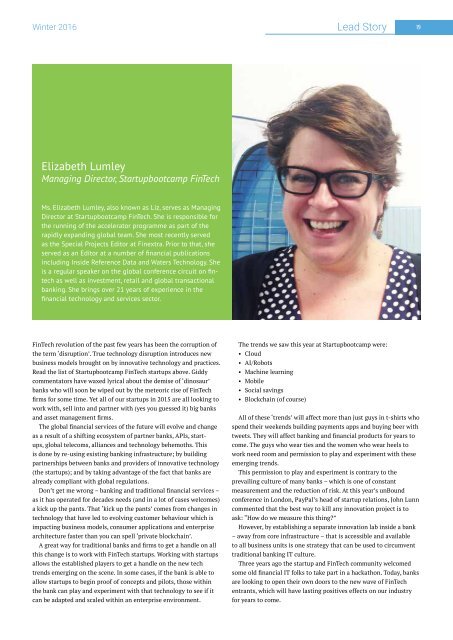Revolutionizing the Financial Markets
With more than 100 000 subscribers of which 70% are banks, Financial IT is focused on publishing news about the leading financial technologies in the world, including the blockchain technology and cryptocurrencies. The February issue of the magazine dedicates its cover to the Founder and CEO of OneCoin, Dr. Ruja Ignatova, and with a 2 pages article sharing OneCoin's story & vision to the world. As Financial IT continies to follow the developments in the company, we are pleased to be recognized as one of the major cryptocurrencies and a key player that shapes the future of payments.
With more than 100 000 subscribers of which 70% are banks, Financial IT is focused on publishing news about the leading financial technologies in the world, including the blockchain technology and cryptocurrencies.
The February issue of the magazine dedicates its cover to the Founder and CEO of OneCoin, Dr. Ruja Ignatova, and with a 2 pages article sharing OneCoin's story & vision to the world. As Financial IT continies to follow the developments in the company, we are pleased to be recognized as one of the major cryptocurrencies and a key player that shapes the future of payments.
Create successful ePaper yourself
Turn your PDF publications into a flip-book with our unique Google optimized e-Paper software.
Winter 2016 Lead Story 19<br />
Elizabeth Lumley<br />
Managing Director, Startupbootcamp FinTech<br />
Ms. Elizabeth Lumley, also known as Liz, serves as Managing<br />
Director at Startupbootcamp FinTech. She is responsible for<br />
<strong>the</strong> running of <strong>the</strong> accelerator programme as part of <strong>the</strong><br />
rapidly expanding global team. She most recently served<br />
as <strong>the</strong> Special Projects Editor at Finextra. Prior to that, she<br />
served as an Editor at a number of financial publications<br />
including Inside Reference Data and Waters Technology. She<br />
is a regular speaker on <strong>the</strong> global conference circuit on fintech<br />
as well as investment, retail and global transactional<br />
banking. She brings over 21 years of experience in <strong>the</strong><br />
financial technology and services sector.<br />
FinTech revolution of <strong>the</strong> past few years has been <strong>the</strong> corruption of<br />
<strong>the</strong> term ‘disruption’. True technology disruption introduces new<br />
business models brought on by innovative technology and practices.<br />
Read <strong>the</strong> list of Startupbootcamp FinTech startups above. Giddy<br />
commentators have waxed lyrical about <strong>the</strong> demise of ‘dinosaur’<br />
banks who will soon be wiped out by <strong>the</strong> meteoric rise of FinTech<br />
firms for some time. Yet all of our startups in 2015 are all looking to<br />
work with, sell into and partner with (yes you guessed it) big banks<br />
and asset management firms.<br />
The global financial services of <strong>the</strong> future will evolve and change<br />
as a result of a shifting ecosystem of partner banks, APIs, startups,<br />
global telecoms, alliances and technology behemoths. This<br />
is done by re-using existing banking infrastructure; by building<br />
partnerships between banks and providers of innovative technology<br />
(<strong>the</strong> startups); and by taking advantage of <strong>the</strong> fact that banks are<br />
already compliant with global regulations.<br />
Don’t get me wrong – banking and traditional financial services –<br />
as it has operated for decades needs (and in a lot of cases welcomes)<br />
a kick up <strong>the</strong> pants. That ‘kick up <strong>the</strong> pants’ comes from changes in<br />
technology that have led to evolving customer behaviour which is<br />
impacting business models, consumer applications and enterprise<br />
architecture faster than you can spell ‘private blockchain’.<br />
A great way for traditional banks and firms to get a handle on all<br />
this change is to work with FinTech startups. Working with startups<br />
allows <strong>the</strong> established players to get a handle on <strong>the</strong> new tech<br />
trends emerging on <strong>the</strong> scene. In some cases, if <strong>the</strong> bank is able to<br />
allow startups to begin proof of concepts and pilots, those within<br />
<strong>the</strong> bank can play and experiment with that technology to see if it<br />
can be adapted and scaled within an enterprise environment.<br />
The trends we saw this year at Startupbootcamp were:<br />
• Cloud<br />
• AI/Robots<br />
• Machine learning<br />
• Mobile<br />
• Social savings<br />
• Blockchain (of course)<br />
All of <strong>the</strong>se ‘trends’ will affect more than just guys in t-shirts who<br />
spend <strong>the</strong>ir weekends building payments apps and buying beer with<br />
tweets. They will affect banking and financial products for years to<br />
come. The guys who wear ties and <strong>the</strong> women who wear heels to<br />
work need room and permission to play and experiment with <strong>the</strong>se<br />
emerging trends.<br />
This permission to play and experiment is contrary to <strong>the</strong><br />
prevailing culture of many banks – which is one of constant<br />
measurement and <strong>the</strong> reduction of risk. At this year’s unBound<br />
conference in London, PayPal’s head of startup relations, John Lunn<br />
commented that <strong>the</strong> best way to kill any innovation project is to<br />
ask: “How do we measure this thing?”<br />
However, by establishing a separate innovation lab inside a bank<br />
– away from core infrastructure – that is accessible and available<br />
to all business units is one strategy that can be used to circumvent<br />
traditional banking IT culture.<br />
Three years ago <strong>the</strong> startup and FinTech community welcomed<br />
some old financial IT folks to take part in a hackathon. Today, banks<br />
are looking to open <strong>the</strong>ir own doors to <strong>the</strong> new wave of FinTech<br />
entrants, which will have lasting positives effects on our industry<br />
for years to come.





